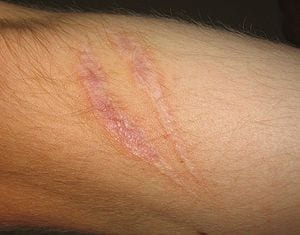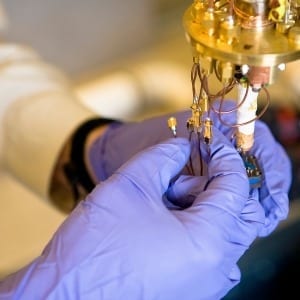
Patients with diseases such as diabetes suffer from painful wounds that take a long time to heal making them more susceptible to infections that could even lead to amputations.
A*A*STAR’s discovery paves the way for therapeutics to improve healing of such chronic wounds, which are a significant burden to patients.
1. Scientists from A*STAR’s Institute of Medical Biology (IMB) have identified a molecular “switch” that controls the migration of skin cells necessary for wounds to close and heal. This is especially significant for diabetics and other patients who suffer from chronic wounds, wounds that do not heal or take years to do so, which are vulnerable to infections and could lead to amputations. This switch mechanism may hold the key to developing therapeutics that will reduce or prevent chronic wounds.
2. The scientists discovered that a tiny “micro-RNA” molecule, called miR-198, controls several different processes that help wound healing, by keeping them switched off in healthy skin. When skin is wounded, the manufacture of miR-198 quickly stops and the levels of miR-198 drop, switching on many wound healing processes.
3. In the non-healing wounds of diabetics, miR-198 does not disappear and wound healing remains blocked. This therefore identifies miR-198 as a potential diagnostic biomarker for non-healing wounds. These findings were recently published in the prestigious journal Nature.
4. The research leading to this discovery was carried out in collaboration with A*STAR’s Bioinformatics Institute (BII), National University Hospital (NUH), Singapore and Jnana Sanjeevini Diabetes Center, Bangalore, India.
Importance of this discovery
5. Chronic wounds in patients with diabetes are a major global health burden and the most common cause of lower extremity amputations. In Singapore, diabetes is the fifth most common medical condition diagnosed and one in nine people aged 18 to 69 has diabetes.[2] Unfortunately, chronic wounds are currently poorly understood and insufficiently treated. Chronic wounds also tend to affect the elderly and disabled patients, especially those confined to a wheelchair or bed-bound.
The Latest Bing News on:
Wound Healing
- HSHS St. Anthony’s Wound Healing Center recognized for superiority in patient satisfaction and wound healing rateson April 25, 2024 at 2:10 pm
HSHS St. Anthony’s Memorial Hospital’s Wound Healing Center has once again been named a recipient of the Center of Distinction award by Healogics, the nation’s largest provider of advanced wound ...
- West Tennessee Healthcare opens new wound clinic in Jacksonon April 25, 2024 at 7:34 am
West Tennessee Healthcare held a ribbon cutting today celebrating its new location of the Wound Healing Center in West Jackson.
- The Prison Program Healing Lifetimes of Painon April 25, 2024 at 6:24 am
A course based on the Enneagram Personality Test helps incarcerated people process their trauma and forge a new path forward. Here is one woman’s story.
- 14 reasons why Christians should believe in divine healingon April 25, 2024 at 4:39 am
Some individuals within the church mistakenly align the doctrine of physical healing with the so-called prosperity gospel ...
- AI smartphones may soon help monitor chronic wounds from homeon April 24, 2024 at 5:00 pm
The goal is to empower patients by giving them free, usable technology they can download that will provide exact measurements on how the wound is healing — and keep them out of the hospital. “Chronic ...
- North Lebanon man on trial for child abuse dead from self-inflicted gunshot wound: DAon April 24, 2024 at 12:02 pm
A North Lebanon Township man on trial for abuse of his infant child was found in his home this morning with a self-inflicted gunshot wound to his head and later pronounced dead at Hershey Medical ...
- Puppy recovers from gunshot wound — and is ready for his next chapter. Meet Biscuiton April 23, 2024 at 3:17 pm
Biscuit the Labrador mix was moved from an overcrowded shelter in Mississippi to a Massachusetts shelter, where staffers noticed a prominent wound on his head but weren’t sure where it came from, ...
- Stem Cell Magic: Scientists Unveil New Superhero for Healing Diabetes Woundson April 23, 2024 at 10:13 am
Researchers unveiled a novel therapy for diabetic wound healing. The new research highlights the use of exosomal miR-4645-5p from hypoxic bone marrow mesenchymal stem cells (BMSCs) to significantly ...
- Scabs: Nature's Ugly Healing Process We Loveon April 18, 2024 at 5:06 am
Scabs may not be the most glamorous look, but they're actually superheroes in disguise! They shield your wounds from nasty germs and give your skin the chance to make a miraculous comeback. But be ...
- Can Vinegar Help Heal Wounds And Kill Bacteria? A Review By Nutrition Professionalson April 17, 2024 at 2:28 pm
Expert opinion from Kelsey Masso Master of Science in Health and Wellness Management /Bachelor of Science in Food and Nutrition · 2 years of experience · USA There is some evidence to suggest that ...
The Latest Google Headlines on:
Wound Healing
[google_news title=”” keyword=”Wound Healing” num_posts=”10″ blurb_length=”0″ show_thumb=”left”] [/vc_column_text]The Latest Bing News on:
Chronic wounds
- Advanced Wound Care Market Empowering Perspectives the Dynamics of Effective Focus Group Researchon April 25, 2024 at 9:40 pm
Advanced Wound Care Market is valued approximately USD 15 billion in 2019 and is anticipated to grow with a healthy growth rate of more than 9.8% over the forecast period 2020-2027. Advanced wound ...
- Wound Care Centers Market Uncovering Truths, The Power of Focus Groups in Qualitative Researchon April 25, 2024 at 9:16 pm
Request To Download Free Sample of This Strategic Report @- Wound Care Centers Market is valued approximately at USD 36.1 billion in 2019 and is anticipated to grow with a healthy growth rate of more ...
- MediWound to Present New Data from EscharEx® Phase II Studies at Three Leading Wound Care Conferenceson April 25, 2024 at 5:01 am
Oral presentations include additional comparative data between EscharEx® and SANTYL®, and new analyses show strong correlation between wound bed preparation and wound healing Analyses validate the ...
- AI smartphones may soon help monitor chronic wounds from homeon April 24, 2024 at 5:00 pm
In the near future, patients may also be able to monitor their chronic wounds from the comfort of their homes through mobile artificial intelligence (AI) technology being developed at the University ...
- HSHS St. Anthony's Wound Healing Center Again Receives Honorson April 24, 2024 at 4:39 am
When you have a wound that will not heal, you need expert, compassionate care.
- Why does it take longer for wounds of diabetic patients to dry up? Know how to avoid thison April 24, 2024 at 12:58 am
Diabetes, a prevalent metabolic disorder, not only impacts blood sugar levels but also poses challenges in wound healing. Understanding why ..|News Track ...
- Revolutionary chronic wound treatment could help millions, reveals studyon April 23, 2024 at 8:30 am
An effective treatment for chronic wounds that does not involve antibiotics, but an ionised gas to activate a wound dressing, has been developed by a team of international scientists.
- Premier Health recognized for excellence in wound healingon April 19, 2024 at 10:52 am
The Wound Care Center and Hyperbaric Services at three Premier Health hospitals – Atrium Medical Center, Miami Valley Hospital South, and Upper Valley Medical Center – have been recognized with ...
- Global Traditional Wound Management Market Poised for Steady Growth, Expected to Exceed US$ 6,638 Million by 2033on April 17, 2024 at 7:53 pm
Traditional Wound Management Market an anticipated market size exceeding US$ 6,638 million by 2033 with a consistent CAGR of 2.5%.
- Global Wound Debridement Products Market Growth, Forecasted to Reach US$ 7.52 Billion by 2033, with a 5.2% CAGRon April 17, 2024 at 6:47 am
The global wound debridement products market is poised for continued growth, with a projected value of US$ 7.52 billion by 2033. This signifies a steady Compound Annual Growth Rate (CAGR) of 5.2% from ...
The Latest Google Headlines on:
Chronic wounds
[google_news title=”” keyword=”chronic wounds” num_posts=”10″ blurb_length=”0″ show_thumb=”left”]









